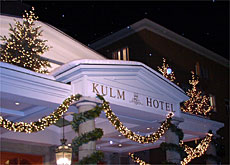Historian warns of threat to hotel heritage

Switzerland’s leading expert on historic hotels, Roland Flückiger, has pleaded for the creation of a national archive.
In an interview with swissinfo, Flückiger says important historical documents from the 19th century tourism boom are being lost forever because there is nowhere to store them.
Flückiger, a curator at Bern’s heritage office, has led efforts over the past decade to preserve Switzerland’s historic hotels, especially those built during the Belle Époque.
He is also president of the committee which awards the Swiss Historic Hotel/Restaurant of the Year, supported by the Swiss branch of the International Council on Monuments and Sites (ICOMOS).
In two books (in German only), he has chronicled the unparalleled tourism boom in Switzerland in the latter half of the 19th century and early years of the 20th, which resulted in the construction of grand hotels across the country.
Many of these landmark buildings have been saved, but Flückiger says the restoration of old hotels is not enough to secure Switzerland’s tourism heritage.
swissinfo: The hotel industry acknowledges the value of old hotels. What work still needs to be done?
Roland Flückiger: There has to be a place where historical records can be preserved, so that future generations will know why tourism played such an important role in Switzerland.
But this type of place does not yet exist and that’s extremely regrettable. We’ve got every kind of museum in Switzerland: museums for music boxes and children’s museums, but no museum or archive for hotels and tourism.
swissinfo: But Switzerland has managed to preserve many historic hotels.
R.F.: We’re at the point where many hotels are losing their ‘memory’ since the new generation of hotel manager has a tendency to discard historical records when they clean house.
That results in the loss of a century of hotel heritage, which is gone forever. There are examples of prominent hotels where the managers know nothing of the building’s history. They are only employed to ensure the smooth running of the establishment.
swissinfo: How rich is Switzerland’s hotel heritage?
R.F.: Many hotels were built in the 19th century when Switzerland was one of the leading tourism destinations in Europe. Many of the buildings have been preserved largely because Switzerland did not suffer any destruction during subsequent wars.
swissinfo: Was there opposition at the time to the building of so many grand hotels, especially in the mountains?
R.F.: Opposition began around 1905 when the Swiss Heritage Society set out to limit or prevent the desecration of the countryside through the construction of large hotels and even mountain railways. There were many such projects at the beginning of the 20th century, including plans to build a railway to the top of the Matterhorn.
swissinfo: You say in your latest book “Hotel Palaces” that Belle Époque hotels fell out of favour and many were torn down or altered beyond recognition. What led to a re-evaluation?
R.F.: A plan was put forward around 1980 to tear down the Giessbach Hotel on Lake Brienz (see related items) and build a giant chalet-style hotel in its place. But a citizens’ group rallied enough support to save it. A key event in the mid-1990s was when conservators [including Flückiger] convinced the Swiss Hotel Association of the value of historical buildings.”
swissinfo: It is often said that restoring an old building is more costly than constructing a new one. How do conservators counter these charges?
R.F.: That’s a long-standing myth which is slowly being corrected. I recently saw the results of a study conducted in Germany that found that restoration work is about five per cent cheaper than building anew.
swissinfo: You took up the cause of historic hotels long before anyone else seemed interested. Has it been a one-man crusade?
R.F.: I felt at the beginning as if I was fighting alone for the cause. I was laughed at, but not any more – and support is continuing to grow. For example, I’ve been able to present findings at the Council of Europe and they were well received. There is much goodwill nowadays and I believe there will soon be enough supporters to form an orchestra.
swissinfo-interview: Dale Bechtel
Important dates and facts taken from “Hotel Palaces” by Roland Flückiger:
1830: The first hotels were built in Switzerland to replace simple inns and guesthouses.
1840-1860: For the first time, hotels were built in the countryside, often above a lake or in an isolated mountain setting.
1860: The first grand hotels were constructed, paving the way for the neo-baroque and eclectic structures of the Belle Époque. They satisfied the wishes of Europe’s growing middle class, which was keen to imitate the aristocracy. The hotels were “castles for the people” and guests could play “kings for a week”.
1913: Switzerland had 3,600 hotels which employed 50,000 people. The hotel industry counted 22 million overnight stays that year, a figure which would not be surpassed for another 50 years.
19th century hotel builders and owners were leaders in the introduction of technological innovations such as electric lighting and elevators.

In compliance with the JTI standards
More: SWI swissinfo.ch certified by the Journalism Trust Initiative













You can find an overview of ongoing debates with our journalists here . Please join us!
If you want to start a conversation about a topic raised in this article or want to report factual errors, email us at english@swissinfo.ch.